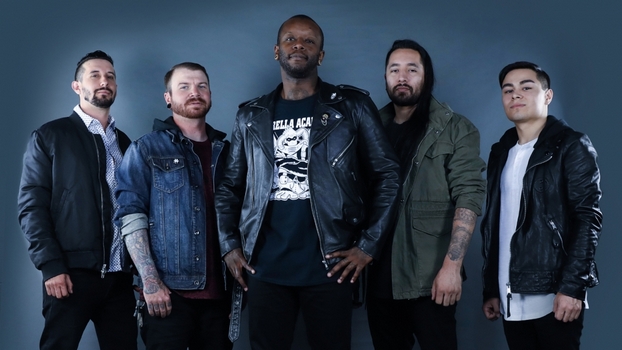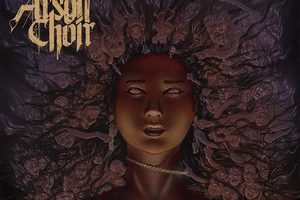The Arson Choir – A World of Monsters
Tuesday, 29th September 2020
A relatively fresh act from California, The Arson Choir put out their first release back in 2017 with Trophy Nation. A bit of noise, a bit of mathcore, and a whole lot of energy, the band is back with a new EP entitled Invisible Monsters, and a new vocalist in tow. Perfect for those seeking some musical chaos with a degree of intricacy and depth to it. We spoke with guitarist Marc Motley about the upcoming EP, an idea for an Instagram album, and the importance of lyrics and visuals, among other topics.
Dead Rhetoric: What do you feel you’ve improved upon since Trophy Nation?
Marc Motley: I’d like to think our songwriting. One of the things I tried to do was incorporate more song structure than in Trophy Nation. That album was a bunch of riffs that I needed to get off my brain. I feel like Invisible Monsters is the same thing – it’s a bunch of riffs I needed to get out, but it felt more put together.
Dead Rhetoric: How does Invisible Monsters represent the band as of right now?
Motley: I definitely think it’s a good snapshot of growth and development, with the new vocalist Phil [Penegar]. I like to think it’s a step in the right direction for the band. When I sit down and listen to the songs, I have to be able to listen to my own band. If I don’t like the music, I can’t listen to it. If you can’t listen to your own band, then why are you doing it? I have to be able to enjoy what I am doing as a listener, as well as a player. There’s a lot of dudes that like to shred and like technique, and that’s cool. But if you can’t sit down and listen to your own stuff, are you really enjoying it? Or are you shredding for yourself?
Dead Rhetoric: What can you say about the cover art for Invisible Monsters? I really liked the look of it.
Motley: I really appreciate that you liked it. That was a lot of back and forth with the artist. To be honest, the first rendition of what we had looked nothing like that. It was almost more old Japanese art influenced. But this one, the way he put it together, it came out amazing. Phil and the artist, Roshi, were going back and forth with figuring out ideas and concepts and what it means. What it came down to being was this beautiful woman, but behind her are all of these demons/monsters that are in her all the time that represent everything going on in your brain, all the time. We felt like it represented all of us – you put on a good face but inside there’s a lot of turmoil and things that you can’t always express.
Dead Rhetoric: You recently put out a video for “Vanisher.” What do you look for when trying to plan out a video?
Motley: We got lucky with that one. I have friends that are pro wrestlers. It literally turned into ‘hey, I have some buddies who would like to wrestle and we have a music video, so let’s figure it out.’ I feel like the ideas for visuals for the music videos are always going on. They are always being talked about. They are always happening. I’m not sure how much I can get into it, but we are already writing the next record with the downtime that we have from not playing shows. The next video idea is already being talked about, and we haven’t even recorded the song yet. I feel like it’s good to have those ideas constantly going because it keeps you excited. It keeps you motivated. We haven’t even gotten to the next recording, and we are already thinking about the next visuals.
Dead Rhetoric: So you see that as a pretty important piece to go along with the music then?
Motley: I think in this time, it has to be. If you aren’t having some sort of visual accompaniment to what you are doing, you aren’t doing justice to the song. The way I digest music is that I jump on YouTube and check out the music videos, the studio videos – it helps to have those kind of things connecting together. I would hope that being able to see The Arson Choir – “Revenge, My Love” was one way to see us. That was one facet of us, and “Vanisher” is another. It’s something else – we aren’t always serious and here’s something that was kind of funny and fun to do. It represents us differently.
Dead Rhetoric: What do you feel is most important to capture, musically, when it comes to more aggressive and chaotic music?
Motley: I do my best to be articulate and interesting. But at the same time, I try to push myself musically. I feel like if I’m not pushing myself or challenging myself at least a little bit…it shouldn’t be easy to do this stuff. That being said, when it’s really aggressive and really chaotic, what’s important to me is to find something that brings my ear back. Like something cool, like a weird note or phrasing or a time signature that catches your ear in just the right way. I hope that those come through. Sometimes I feel like I nail it, and sometimes it just takes a little more work to get to that balance.
Dead Rhetoric: Is a short time frame important for music like this? Obviously you aren’t doing 10-minute tracks like this.
Motley: I think that’s probably just my interpretation of attention. It’s pretty similar to what Instagram is. If you can’t capture somebody’s attention within the first 10 seconds, you won’t keep their attention. I try to keep it condensed. I guess the word is short, but I’d like to say I condense my ideas into a few bars and get it across as soon as possible. My dream, which is going to sound so dumb, but I want to do an Instagram album. Do like 15 songs that are 1-minute each and post it just on Instagram. I don’t know why it got in my head, but it was something that I want to explore at some point. Just songs and videos that are just long enough to go on Instagram and that’s the only place they are going to exist.
Dead Rhetoric: Any reason why Instagram in particular?
Motley: Nope. I just got it in my head that it sounded like a fun idea. I feel like those restrictions make you slightly more creative. I only have 58 seconds to put in 5 to 7 riffs and lyrics to go with it, and on top of that, you have to make a visual that’s appealing.
Dead Rhetoric: I’ve heard that idea before, that by putting some sort of restraint in it helps to be more creative. You have that box you have to fit inside, so you go outside of it to meet up.
Motley: I feel like it would be really interesting. I think it’s something that maybe bands haven’t tried yet.
Dead Rhetoric: Do you feel that the band’s lyrical message is as important as the musical one?
Motley: Absolutely. Phil’s writing is very close to his heart and we wouldn’t have it any other way. This band is about a release. There’s a mental release. Our shows are very energetic and a physical release. I know that he, and the producer, had some heated discussions about the lyrics and lyrical content, and making sure the message was still conveyed, but doing it in a very musical way. I think the lyrical content for Invisible Monsters has very much matured since our last record. Clearly, it’s not the same vocalist, but I’d like to think the message of the lyrics is important, and the music is equally important. I hope they are on the same level.
Dead Rhetoric: You always have the ones who just want music, and the ones who want to dig farther with it.
Motley: Right. I hope that both of those people can find something. Like you said, sometimes you get the guitar nerds like me who just want the guitar music, and that’s fine. But I also like hearing something catchy in there, where it’s like “That line kinda smacks.”
Dead Rhetoric: What goals do you have the band, either short term or long term?
Motley: Honestly, I have personal goals. I would love to go tour Japan. That’s my personal goal. But as far as the band goes, it’s a weird situation. This band exists day by day. We try to just continue the band every day. We have always looked at it as ‘this band could stop tomorrow.’ There’s always a chance that the band could stop tomorrow. We treat every aspect of the band that way. Every show is the last show, every practice could be the last practice. So we try to enjoy it.
We don’t really have a whole bit list of things we want to do, because we are just enjoying the ride as we do it. I feel like a lot of bands forget that. You could be in a car accident tomorrow and it could end. If you don’t appreciate what’s going on right now, as much as the goal might be, it may not happen, so enjoy whatever is coming as you get it.
Dead Rhetoric: Does that give you that extra drive to make sure you always put your best foot forward?
Motley: All the time! I appreciate every little thing. The fact that you want to do an interview, I appreciate that you want to do this with me. I appreciate every little thing, every little comment on social media. Everyone who is about the band – thank you so much. It just makes me feel good. I don’t do this band for likes or attention. I do it because I have these riffs in my head and I have to get them out. It helps my brain and it helps me to stay busy. Anyone that is interested in the band, I will spend 15-20-30 minutes being able to talk because hey, thank you for listening. I appreciate it.
Dead Rhetoric: Anything planned for the band outside of the EP release?
Motley: We have the EP, we have merch. We are already starting to work on the next record because of downtime. We are trying to release as much content as possible, so there’s still a bunch of videos we still have to come out, not just music videos. I hope that when this is over, we can go back to playing shows. We can hit the east coast. That’s what we hope to do, but all of that can’t happen until shows are back.























